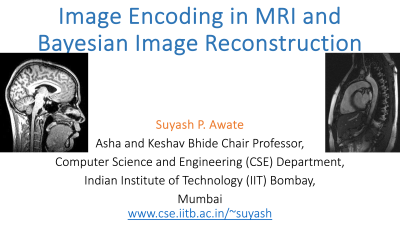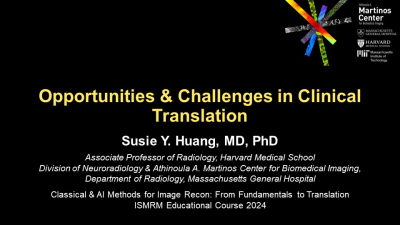Weekend Course
Classical & AI Methods for Image Recon: From Fundamentals to Translation
ISMRM & ISMRT Annual Meeting & Exhibition • 04-09 May 2024 • Singapore

| 13:15 |
 |
Image Encoding in MRI & Bayesian Image Reconstruction
Suyash Awate
Keywords: Image acquisition: Image processing This talk presents the fundamentals underlying magnetic resonance imaging, including various parallel-imaging schemes, and the fundamentals of (Bayesian) image reconstruction methods from subsampled multicoil k-space data. |
| 13:40 |
Low-Rank Methods for MR Image Reconstruction
Fan Lam
Keywords: Image acquisition: Reconstruction Low-rank models that exploit the intrinsic redundancy in multidimensional MR signals for image reconstruction from sparse, noisy, and/or corrupted data have been widely used. These models serve as effective constraints for high-dimensional imaging problems that arise in many applications, e.g., dynamic MRI, quantitative MRI, and spectroscopic imaging. This talk will review what low-rank models are, how low-rank structures emerge or can be purposely induced from multidimensional MR data, and how they may be used in image reconstruction. Potential synergy with recent deep learning based reconstruction approaches will also be discussed. |
|
| 14:05 |
Frontiers in Image Recon: Rapid & Reproducible Quantitative MRI
Nan Wang
|
|
| 14:30 |
Supervised Deep Learning for MRI Recon
Thomas Kuestner
Keywords: Image acquisition: Reconstruction, Image acquisition: Machine learning Motivation: See synopsis Goal(s): See synopsis Approach: See synopsis Results: See synopsis Impact: See summary of main findings |
|
| 14:55 |
Break & Meet the Teachers |
|
| 15:25 |
Unsupervised Methods for Deep MRI Recon
Dong Liang
Keywords: Image acquisition: Reconstruction In recent years, deep learning has made significant advancements in MRI reconstruction. However, conventional methods often require full-sampled MRI data, presenting challenges in data acquisition. Consequently, unsupervised learning methods have garnered attention. This discussion delves into various unsupervised deep learning approaches for MRI reconstruction, including unpaired, self-supervised, and zero-shot (untrained) learning. Moreover, we foresee a promising future for unsupervised learning in MRI reconstruction, particularly in collaboration with large-scale foundation models, thereby facilitating further progress in MRI technology. |
|
| 15:50 |
 |
Opportunities & Challenges in Clinical Translation
Susie Huang
Keywords: Image acquisition: Reconstruction, Image acquisition: Fast imaging This lecture will provide a brief overview of the considerations involved in the clinical translation of classical and artificial intelligence approaches to image reconstruction. The systematic evaluation and validation of new reconstruction methods will be discussed in the context of fast imaging methods for acquisition and reconstruction, with an emphasis on prioritizing image quality, minimizing artifacts, and maximizing diagnostic impact. A multidisciplinary, team-based approach with close collaboration between MRI physicists, engineers, data scientists, radiologists, and radiologic technologists is of paramount importance to ensure that new reconstruction methods are integrated seamlessly into the clinical workflow. |
| 16:15 |
Expectations from New DL Methods: How Can Academia Contribute?
Mariya Doneva
Keywords: Image acquisition: Machine learning The collaboration between academia and industry is vital for advancing the research, translation, and practical implementation of new deep learning techniques for MR reconstruction. There are multiple ways in which academia can contribute, which will be discussed in this lecture. |
|
| 16:40 | Panel Discussion |
The International Society for Magnetic Resonance in Medicine is accredited by the Accreditation Council for Continuing Medical Education to provide continuing medical education for physicians.